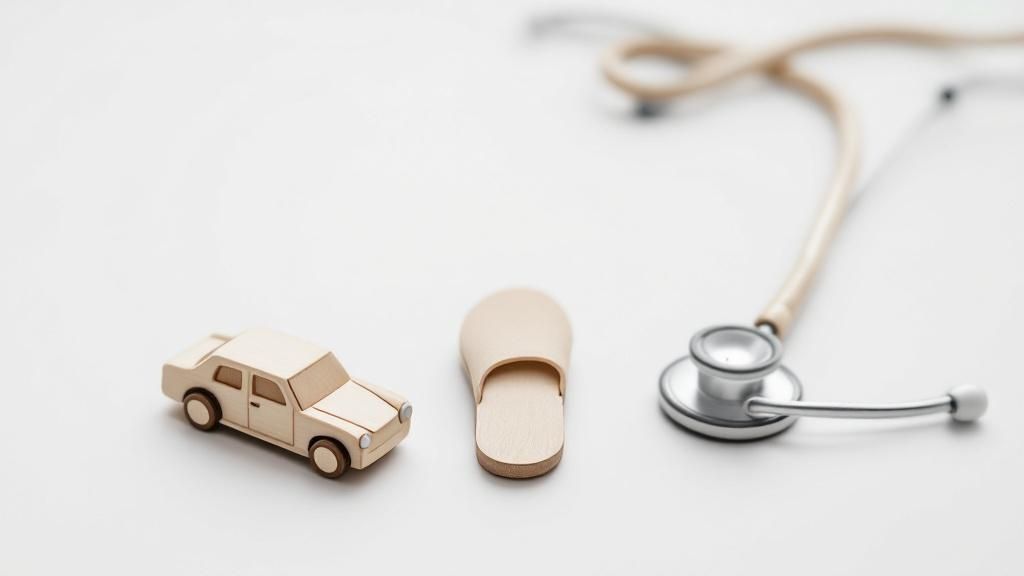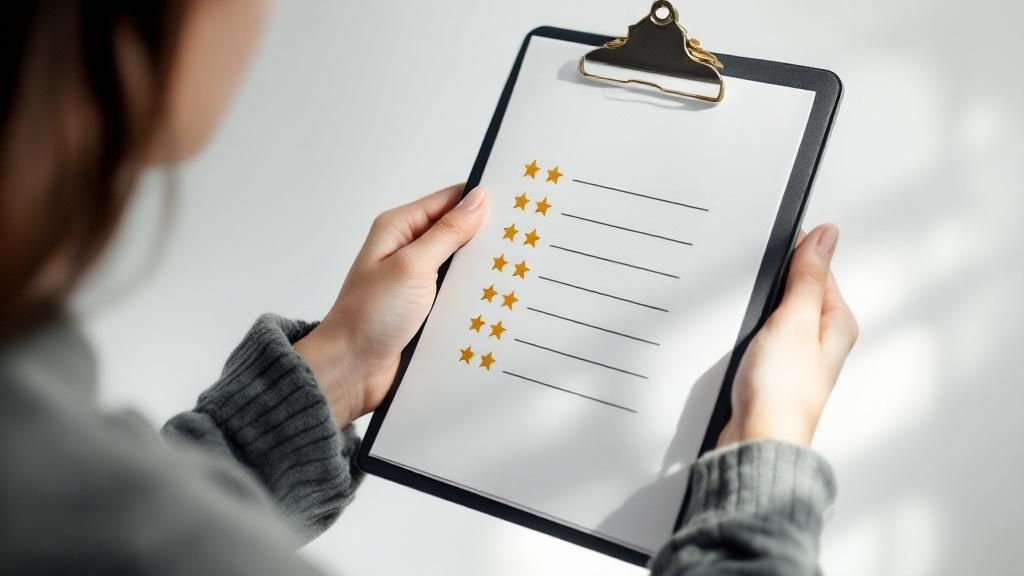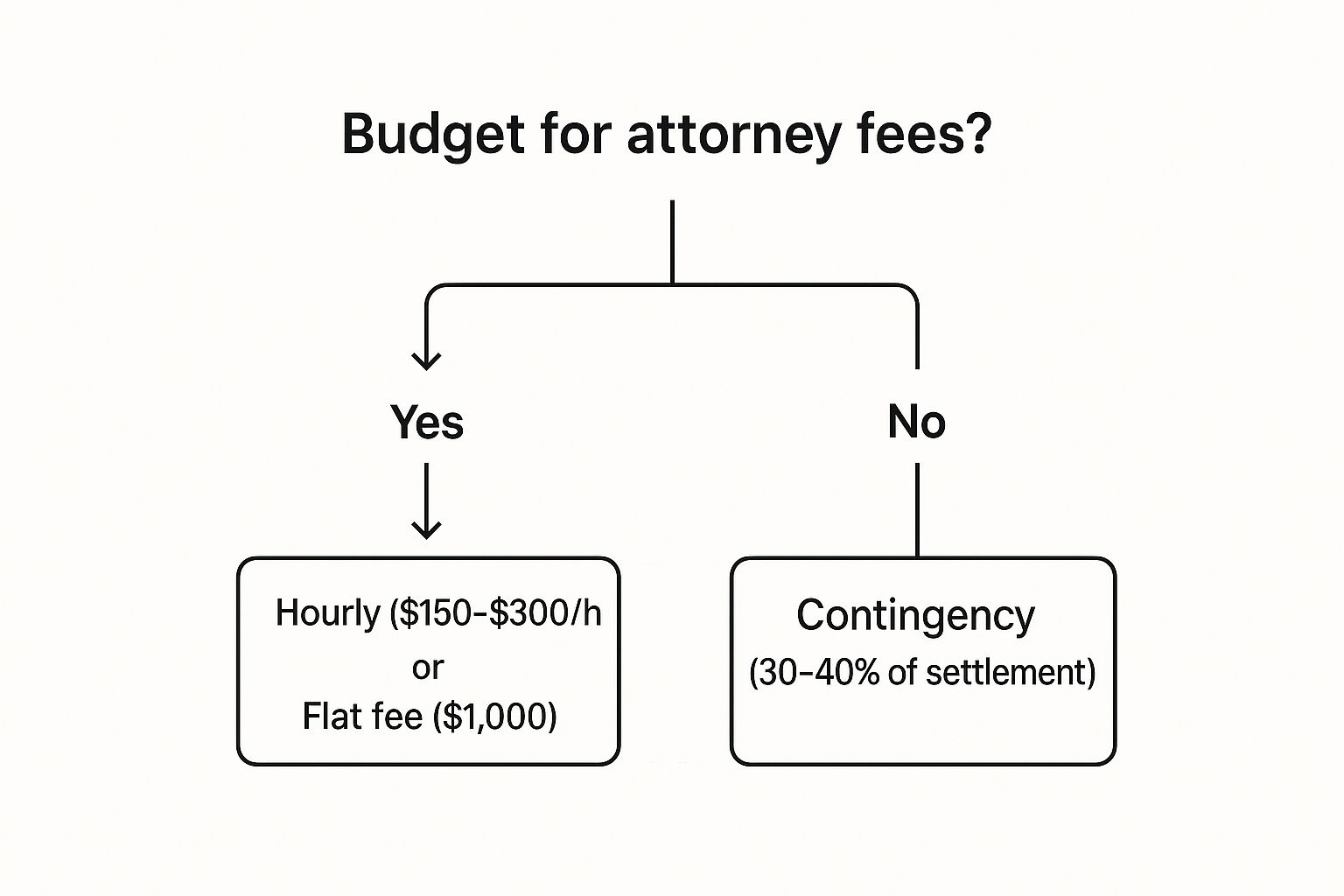How to Find Personal Injury Lawyer: Expert Tips to Choose Right
"I was satisfied once John Bell took over my case."
"Communication was always timely."
How to Find Personal Injury Lawyer: Expert Tips to Choose Right
When you're dealing with an injury, the last thing you want is a drawn-out, frustrating hunt for a lawyer. The trick is to start smart by building a solid list of potential candidates before you even think about making calls.
Let's walk through how to find those first few promising names.
Building Your Initial List of Potential Lawyers
A quick Google search might feel like the right first move, but I've found that a more methodical approach yields much better results. You'll save time and end up with a higher-quality list of attorneys to consider.
Your best bet is to start with people you already trust. Ask friends, family members, or even coworkers if they've ever worked with a personal injury attorney in Oregon. A personal recommendation is gold because it gives you real insight into how that lawyer operates—their communication style, their process, and most importantly, whether they got a good result.
Don't forget about other professionals in your network. If you have an attorney you use for business or estate planning, ask them for a referral. Lawyers know other lawyers, and they can often point you to someone who has a stellar reputation within the legal community for handling injury cases.
Doing Your Homework Online
Once you have a few names, it's time to do some online digging. Think of a lawyer's website as their digital handshake.
Here's what I look for right away:
- A Clear Focus: Does their website scream "personal injury"? You want a specialist, not a generalist who dabbles in everything. Look for specific pages on cases like yours, whether it's car accidents, slip and falls, or workers' comp.
- Proof of Performance: Good lawyers aren't shy about their successes. Look for a section on case results, settlements, or client testimonials. This shows they have a track record of getting things done.
- Who Are They?: Take a minute to read the attorney bios. How long have they been practicing in Oregon? What's their background? You can get a good feel for their philosophy and experience.
This initial research is all about filtering. Remember, there are roughly 164,559 personal injury lawyers in the United States, so narrowing your search to a true Oregon specialist is essential. For a deeper look at the numbers, you can explore additional personal injury statistics.
As you start your search, it helps to have a clear idea of what you're looking for. This table breaks down the core qualities of a strong personal injury lawyer.
Key Qualities of a Top Personal Injury Lawyer
| Specialization in Personal Injury | This isn't a field for generalists. You need someone who lives and breathes Oregon injury law, knows the local courts, and understands insurance company tactics. | Lawyer's website, Oregon State Bar profile, professional directories like Avvo. |
| Verifiable Track Record | Past success is the best predictor of future results. Look for evidence of significant settlements and trial verdicts. | "Case Results" or "Verdicts & Settlements" section on their website, client reviews. |
| Positive Client Testimonials | Reviews from past clients give you a real-world glimpse into their communication style, professionalism, and client service. | Google, Avvo, Yelp, and the lawyer's own website (read with a critical eye). |
| Good Standing with the Bar | This is a non-negotiable baseline. It confirms they are licensed and have no public history of professional misconduct. | The official Oregon State Bar member directory. |
Think of this table as your checklist. If a potential lawyer doesn't tick these boxes, it's probably best to move on to the next name on your list.
Crucial First Step: Before you go any further, take each name on your list and run it through the Oregon State Bar member search. It takes two minutes and confirms they're licensed and in good standing. It’s a simple check that protects you from wasting time with someone who isn't a credible, qualified professional.
Vetting a Lawyer's Real-World Experience

Alright, you've got your shortlist. Now comes the crucial part: digging deeper than the homepage claims. Seeing "20 years of experience" on a website is one thing, but that number only matters if it's the right kind of experience.
Think about it this way: a lawyer who has spent two decades defending DUII cases isn't the person you want handling your complex workers' compensation claim. Their skills just don't match up.
You need to find an attorney whose background lines up with the specifics of your situation. If you were injured in a multi-car pileup on I-5, you need someone who’s an old hand at accident reconstruction, juggling multiple insurance carriers, and navigating Oregon's unique traffic laws.
Specialization Is Non-Negotiable
A general practice lawyer might be fantastic for drafting a will or a business contract, but personal injury law is a whole different beast. It demands a specialized understanding of everything from reading medical charts to countering insurance company tactics in the courtroom.
Look for a firm that is upfront and proud of its focus. Their website's case results and client testimonials should be filled with stories that sound a lot like yours. If all their recent victories are in slip-and-fall cases, but a drunk driver hit you, they probably aren't the best fit.
Trial Experience vs. Settlement Mills
Here’s a statistic that might surprise you: over 95% of personal injury cases never see the inside of a courtroom. They settle. Some law firms, known as "settlement mills," build their entire business on this fact, pushing for quick settlements that might leave money on the table.
A fair settlement is often the ideal outcome, but you need a lawyer who isn't afraid to go to trial if the offer isn't right. Believe me, insurance companies know which lawyers will actually fight and which ones will take the first lowball offer to close the file.
Key Takeaway: An attorney with a solid reputation for taking cases to court often gets much better settlement offers. Why? Because the insurance company knows they're serious and won't just roll over. That's negotiating from a position of strength, and it directly benefits you.
When you have that initial consultation, don't be shy. Ask them directly about their experience in the courtroom.
- When was the last time you took a case like mine to trial?
- Roughly what percentage of your cases settle versus go to a jury verdict?
- Are you fully prepared to take my case to court if the insurance company plays hardball?
Their answers will reveal their entire philosophy. You're not just looking for a negotiator; you're looking for a genuine litigator. Getting a clearer picture of how to choose a personal injury lawyer can help you ask the right questions during this critical stage.
Making the Most of Your Initial Consultation

Think of this first meeting as more than just a "hello." It's your chance to interview a potential legal partner. If you approach it with the same mindset as a job interview, you'll be in a much better position to decide if this is the right person to fight for you.
A little preparation goes a long way. You don't need to haul in a mountain of paperwork, but bringing the right documents gives the attorney a real-time, concrete look at your claim right from the start.
Try to gather these key items before you go:
- The official police or incident report
- Any photos or videos you took at the scene
- Names and phone numbers for any witnesses
- All medical records and bills you've received so far
- A letter or pay stubs showing your lost wages
Walking in organized sends a clear signal that you’re serious. It also helps the lawyer get a firm grasp of the facts without having to guess.
Asking the Right Questions to Find Your Lawyer
Okay, now for the important part. The questions you ask will tell you everything you need to know about an attorney's experience, communication style, and general approach. This is where you really figure out if they're a good fit.
Don't just ask if they've handled "cases like yours." Go deeper than that.
- Communication Style: "Who will be my day-to-day contact? Will it be you, a paralegal, or a case manager? And how often will I hear from your office with updates?"
- Case Strategy: "From what you've seen so far, what do you believe are the biggest strengths of my case? More importantly, what are the potential weaknesses we'll need to overcome?"
- Fees and Costs: "Can you walk me through your contingency fee agreement? What happens with case costs, like expert witness fees, and am I responsible for them if we don't win?"
Pay close attention to how they answer. Are they giving you straight, clear responses, or are their answers vague? An attorney who is upfront about the potential challenges is far more credible than one who promises a massive settlement before they even know all the facts.
Expert Tip: Notice how the lawyer treats you during this first meeting. Do they genuinely listen to your story, or do they cut you off to jump to conclusions? A lawyer who makes you feel heard and respected from the very beginning is likely to be a strong, supportive advocate when things get tough.
Ultimately, your gut feeling matters. This person will be guiding you through one of the most stressful experiences of your life, so your comfort level is just as crucial as their credentials. You need to trust them completely.
Why a Firm's Technology and Communication Matter

Let's be honest, in today's world, a law firm still running on paper files and endless games of phone tag is a red flag. The way a firm uses technology says a lot about its efficiency and how much it values your time.
When you're recovering from an injury, the last thing you need is more hassle. A modern firm should make your life easier, not more complicated. This means offering practical tools like a secure online portal where you can see case updates 24/7 or the ability to sign documents from your couch instead of driving across town.
Assessing Their Tech and Communication Style
When you have that first consultation, don't be shy about asking how they'll keep you updated. Are they set up for quick questions via secure messaging, or is everything a formal phone call that takes days to schedule?
Firms that are on top of their game often use specialized software to stay organized, sometimes even using advanced speech-to-text tools for productivity to keep things moving quickly behind the scenes. That kind of efficiency means they spend more time working on your case and less time wrestling with outdated processes.
This isn’t just about convenience; it directly impacts a firm's success. A recent legal industry report found that tech-savvy firms generate 51% more client leads and see 52% more revenue. That tells you something important: investing in good technology leads to a better-run practice and, ultimately, a smoother experience for you.
Key Insight: Think of a firm's communication process as a window into its soul. If they make it easy to get answers and share documents securely, it’s a great sign they respect your time and prioritize keeping you in the loop.
Clear, consistent communication is absolutely crucial as your case moves forward. Knowing what to expect at each stage can dramatically lower your stress levels, which is why we break down the entire car accident settlement process for our clients. A good lawyer ensures you're never left guessing.
Making Your Final Decision with Confidence
You've done the hard work. You've researched their backgrounds, checked their track records, and sat through a few initial consultations. Now you're probably looking at a short list of two or three highly qualified lawyers, and the final choice can feel overwhelming.
This is the point where you have to look past the resumes and focus on the human connection.
The best lawyer for your case is someone you genuinely trust. Think back on your conversations. Who took the time to explain things in a way you actually understood, without a bunch of legal jargon? Who really listened when you told them what happened? This is a partnership, and you need to feel like you're on the same team.
Trust Your Gut
After you've compared all the practical stuff—their experience with cases like yours, their communication style, their resources—it often comes down to a gut feeling. This is a valid and powerful tie-breaker.
You're going to be sharing very personal, often painful, details about your life, your health, and your finances. Having a good rapport from the start will make navigating the tough parts of your case so much easier down the road.
Final Checkpoint: Before signing a single piece of paper, ask to review their fee agreement one last time. Make sure you are 100% clear on the contingency fee percentage, how case costs are paid (and by whom), and what happens if you don't win. Getting clarity now prevents major headaches later.
This decision tree gives you a visual breakdown of how different fee structures can work, which is a critical piece of your final decision.

The good news is that nearly all personal injury lawyers work on a contingency fee basis. This means you don’t owe them a dime unless they win your case. By choosing the right person, you can finally feel confident that you have a skilled, dedicated advocate fighting for you.
Questions That Come Up When Hiring a Personal Injury Lawyer
https://www.youtube.com/embed/nqAP7r_BBlc
Even after you've done your research, you're bound to have a few more questions pop up. It's only natural. Let's walk through some of the most common concerns I hear from clients when they're looking for the right attorney.
How Much Does a Lawyer Cost?
This is usually the first thing on everyone's mind, and for good reason. The good news is, you almost never have to pay a lawyer out of your own pocket to get started.
Nearly all personal injury attorneys work on a contingency fee basis. In plain English, this means their fee is a percentage of the money they recover for you. You don't pay anything upfront. The typical fee ranges from 33% to 40% of the final settlement or verdict. If your lawyer doesn't win your case, you owe them nothing for their time.
When Should I Contact an Attorney?
The short answer? As soon as you can.
Time is of the essence after an injury. Oregon has strict deadlines, known as statutes of limitations, for filing a lawsuit. If you miss that window, you can lose your right to seek compensation forever. Getting an attorney involved early also helps them preserve crucial evidence and interview witnesses while the details are still fresh in their minds.
What if the Insurance Company Makes a Quick Offer?
It’s tempting, I get it. An insurance adjuster might call you just days after the accident with what sounds like a decent offer. Be wary of this tactic.
These initial offers are almost always lowball figures designed to make your claim go away quickly and cheaply. They are betting you don't know the true value of your case.
An experienced lawyer knows how to calculate the full, long-term costs of an injury. This isn't just about the medical bills you have today; it includes future treatments, lost earning potential, and the real-world impact of your pain and suffering. Never accept an offer without having a professional review it first.
Dealing with insurance companies can be a battle, so understanding how to appeal insurance denial is often part of the process. If you have more questions, our page on frequently asked personal injury questions has a wealth of information.
At Bell Law, our experienced Oregon attorneys are here to answer all your questions and fight for the compensation you deserve. If you've been injured, contact us today for a free, no-obligation consultation.
Disclaimer: The information on this page is provided for general informational purposes only and is not legal advice. Reading this content does not create an attorney-client relationship. For advice about your specific situation, please contact a licensed attorney.







